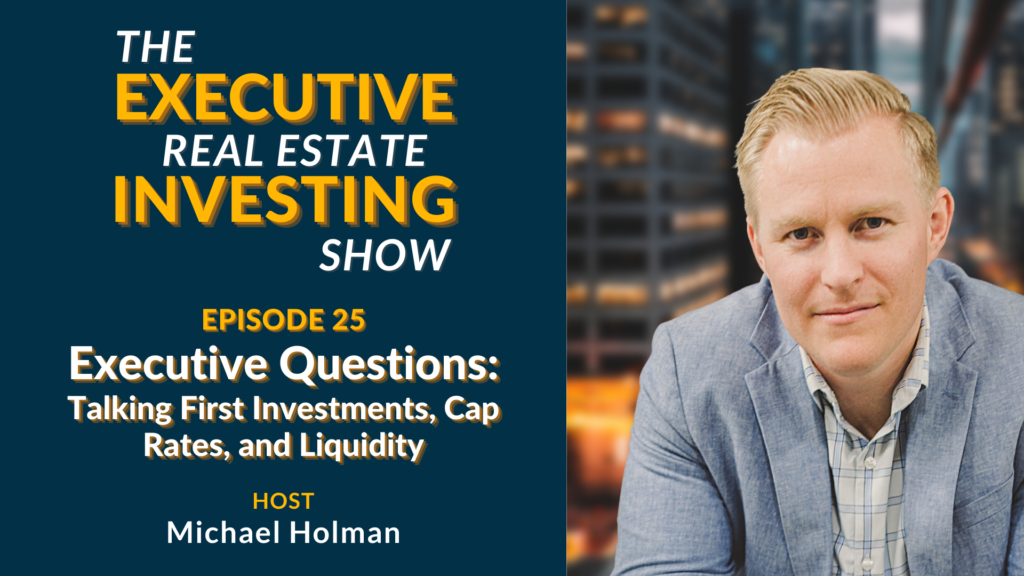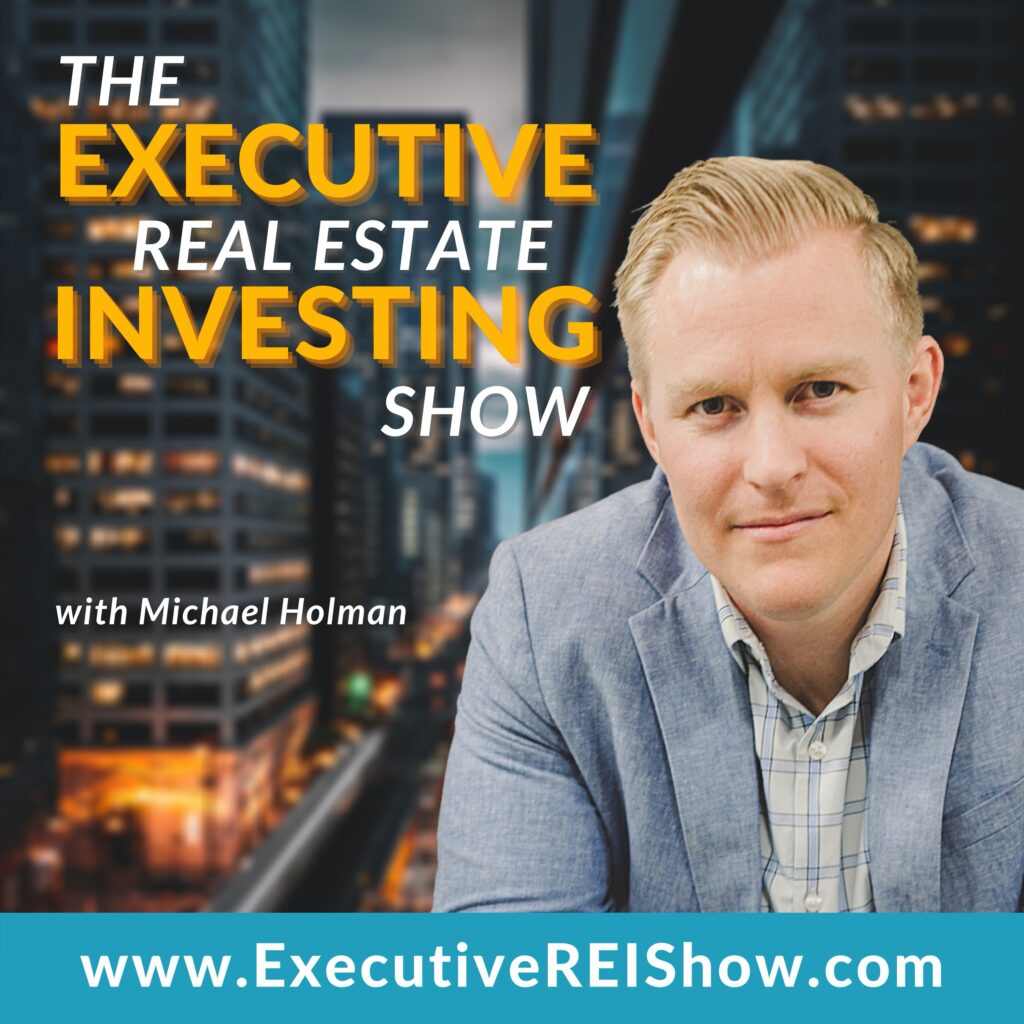
The executive Real estate investing Show
EPISODE 25
Real Estate Investing Q&A: Talking First Investments, Cap Rates, and Liquidity with Michael Holman
- November 22, 2021
EPISODE SUMMARY
As part of our ongoing series Executive Questions, Michael opens up the digital mailbag to field questions from listeners. Topics include: Can you really succeed in Real Estate Investment with no starting capital? How do cash on cash returns work? What is a good cap rate? What should multi-family investors look for in a “per door” building price? And—How does liquidity work?
Listen now as Michael answers these questions and expands on each topic to give his advice, based on years of executive experience.
EXECUTIVE TIP
Be Relentless
Michael and many of his guests have commented that their success comes from never giving up. Create a goal for yourself and do everything in your power to achieve it. Educate yourself, find partners who share your ideals and drive, and go for it.
LISTEN TO THE PODCAST HERE

The Executive Real Estate Investing Show Podcast
EP 25: REI Q&A: Talking First Investments, Cap Rates, and Liquidity with Michael Holman
Listen on
READ THE TRANSCRIPT HERE
Note: Audio transcription has been automatically transcribed
Welcome to The Executive Real Estate Investing Show. This podcast is for you, the busy business owner or executive looking to create generational wealth. Here, we’re going to show you how to do that through real estate investing from multifamily to industrial and everything in between. You will become a real estate investing expert. And now, here’s your host, Michael Holman.
Hello everyone, and welcome to another episode of The Executive Real Estate Investing Show. I’m your host, Michael Homan. And I am excited to be here with you today. I’m really excited because today is the executive questions segment. And I love these, I literally just barely sat down and my podcast manager, just handed me this list of questions.
I don’t think I have not read these yet. So, I am really excited. Once again, you are getting this totally raw questions from me and answers on how I can help you, If I can help you. I always get nervous during these a little bit, because I never know what’s going to happen, but I love it. Right. I love getting these and you’re getting honest, true real questions and answers so it’s going to be awesome as always.
Go visit www.ExecutiveREIshow.com. It’s a great website. There’s lots to do on there. You can check out all the past episodes. You can check out the resources, you can sign up for the newsletter that goes out weekly. That’s awesome by the way, I get it. I read it every single time.
In addition, you can also ask one of these executive questions, right? So, for those of you who are watching on YouTube, you can you see this little paper I’m holding. This is a list of the executive questions and prior executive questions. You want to get your name on this list? Like David C. Glenn, G Leo F all these people that we’re going to talk about today.
Well, if you want to get your name on that list and you want to ask your question and have me answer in one of these sessions, go ahead, go to www.ExecutiveREIshow.com, sign up and you can go ask an executive question. It’s right there I believe on the home page, right? Couldn’t be easier. Also, if you’re liking what you’re listening to, we want to get this out to as many people as possible, right?
We’re putting out amazing content, we’re having amazing guests. Go ahead and leave us a rating and review on iTunes, on Stitcher, on Spotify, right? Wherever you listen to your podcasts. And I said, iTunes, I do this doesn’t even exist anymore. Right? It’s apple podcasts. So, so apple podcasts, no matter where you listen to, go ahead, leave us a rating, leave us an honest review.
We want to hear from you. Right. And, and go ahead and show the show, right? I mean, we love it. We get people all the time who were posting on their social media on LinkedIn, Facebook, Instagram. I mean, we’ve had people post on Tik Tok and Twitter about the show about things that are learning on the show, and we love it.
We’ll always shout out we always love getting a shout out as well. So go ahead, share the show, leave a rating and review and let’s get into this executive tip today’s executive tip. Is probably the thing that I would say has given myself in my career the most competitive advantage, and what’s made me be able to grow this company.
And that is to be relentless. All right I just actually was on a podcast, not too long ago for recording. And they asked me, you know, what is the one thing that you feel has separated you from everybody else? So, the one thing that’s made you successful. And as I thought about that question, the only thing that kept coming to my mind is to be relentless, right. There’s always a way and because I mean, I am thinking about it. I can tell you right off, right? I am generally I’m not the smartest in the room. I don’t want to be the smartest in the room and I’m not. No, I’m usually, I’m not necessarily the most intelligent or articulate, you know, but I am relentless.
Right. And that is kind of the attitude and the mindset that you have to have in real estate in business, if you are going to be successful. So once again, today’s executive tip be relentless. All right let’s dive right into these executive tips. The first executive question comes from David C and David said, is there a way to get into commercial real estate when you do not have much money to invest?
Great question, and David, this is a question that we actually get quite frequently, right? And it’s usually from the younger generation. And we get it, real estate investing is a very sexy thing. Right? You see these real estate tycoons who have hotels and apartments and they own everything and it’s sexy, right?
There is a lot of appeal to real estate and to real estate investing and for good reason. What I always tell people when they ask me this type of question, right? The answer is, you know, kind of right what I recommend is if you don’t have, if you don’t have a lot of money, right? If you have less than 25, $50,000 to invest in real estate, and you’re looking to get into real estate you kind of have to start off getting your feet wet, right?
I mean, there’s. Necessarily a ton of options. And so your options are kind of limited to single family, which I know this question specifically says commercial, but you know, single family you can, you can partner with people and which I’ll get into in just a second. But if it’s just you, you’re not interested in actually being like a syndicator or anything, like.
To be honest, you need to go out and focus on how to make money first. Right? So being a syndicator or something like that, that is a job. Right. I classify that as investing as well, but that’s a job. People are making a living off of that. And so when people come to me and I get these people right out of college, they’re like, hey, I want to invest in commercial real estate.
And I say, that’s great. Okay. But you need, you need a couple of things to invest in real estate. Either need money, you need experience or you need a whole lot of time, right? Because you have to add value to someone else in some way. Nobody, this is real estate investing is one of the most collaborative spaces that I’ve ever been a part of.
Right. It’s a very collaborative industry. People are partnering and teaming all of the time, but you have to have something to bring to the table. Right. And in most cases, that’s what. Great. So, my recommendation first off, right before I give any other advice on how to get into commercial real estate with, with not very much money is go out and figure out how to make.
Right, whatever that is, that you are passionate about, that you love to do, that fulfills you and that, and that brings you a solid source of income and money that you can start investing. That is the main focus is your younger, you know, as you get, as you’re younger in your years and younger in your life, you really need to focus in on what is going to make you.
Right. And for some people, you know, that is real estate syndication, right? For some people that is being a dentist or a doctor, or they own a car mechanic shop, or, you know, there is, there is something that they love that they know that they understand and that they’re driving forward. And that really has to be the focus.
Right. You need anybody who tells you, you don’t need any money whatsoever to invest in real estate at all. Right? That’s that is not true meal. Maybe you need a little bit of money. Even if you start off in syndication, you usually need at least a little bit of money, right? Not necessarily ton, but a little bit.
So you got it he has got to get some cash, right? That isn’t a super important thing. Okay. So that’s step one right? No matter what else happened. Go get a job. Now let’s say, Hey, I am committed. I want to invest. And I don’t have a lot of money. Well, I don’t know exactly what that means, but let’s just use an example.
25,000 is the threshold, right? There are the only way you’re getting commercial real estate under generally $25,000 investment. A lot of times that’s going to come in the form of being a limited partner, maybe, you know, most, most syndicators they are not, their minimum raise is going to be well above 25,000.
You might be able to find one somewhere who will do five or 10,000. That is very uncommon, I mean, they’re, they might be out there, but that is probably someone who’s just getting started or somebody who doesn’t have a lot of experience, something like that. So, I, you know, if their minimum is less than 25,000 I would, I would just be cautious, right?
I’m not saying you can’t have a good deal with them, but just go into that eyes wide open and be somewhat cautious in that scenario. The only other ways that that are coming off right off the top of my head is you can do one of the crowdfunding websites. Now you lose some of the benefits, right? I mean, those crowdfunding websites that do real estate.
There’s a couple of them that are like direct real estate. Right? I mean, let me off the top of my head I believe it’s crowd street and real CA crowd, I think are the two don’t quote me on that. I know crowd tree, but I’m not sure about real crowd that are actually direct investments and some of their investments potentially will allow for smaller investment sizes, but even then on most of those webs it’s generally only for accredited investors.
And if you have less than 25,000 to invest you probably aren’t an accredited investor or or we need to have another conversation about your money habits is, is what we need to do there. So for everybody who’s, who’s wondering and accredited investor in general, there’s some other rules, but in general It’s someone who makes over $200,000 a year for the last two years or 300,000 with their spouse.
So each spouse makes 150,000, you’d be considered an accredited investor, or they have a million dollars in net worth not including their primary residence. Those are the basic that’s what still most people do. The sec, not that long ago, came out with some updates, as far as if you have certain licenses, you’re considered accredited some things like that.
But in general, the thing that most people are going to look at first off is his net worth or income. Those are the two main, two main qualifiers. So, the, the other option, if it’s not a direct is an indirect crowdfunding website and that’s something. Say like funds or equity multiple. So you aren’t actually investing directly with the sponsor, your investing with fund dries, who gathers up all your money, all of the people’s money.
And they make an investment into a sponsor or maybe their own, their own fund, but they’re making an investment into the person who is actually doing the real estate. And so while Fundrise’s getting all the benefits of investing in real estate, they are taking a hefty portion of those returns. So, your returns, a lot of times are similar to what you would see in the stock market, right.
Because they’re, and they do that because they’re making it.
They’re trying to make it as easy to invest as the stock market. But like I said, you’re, you’re really missing out on a number of the advantages. Right? Most of those aren’t giving any kind of tax benefits or things like that, that you generally are very powerful in real estate investing. So, I mean, you can do that.
That’s a way to do it. You can kind of see what reporting a generally a sponsor would give. I mean, equity, multiple fundraisers, all those, all those groups they’re going to have there. You’re only going to interface with them. You probably, you might not even know who the, what, who the sponsor is at the end of it.
You might only know the deal that you’re investing in. But they really insert themselves right in the middle of that transaction and take a hefty portion. So your returns, you know, they can be better than the stock market, but a lot of times they’re going to be six. Percent, you know, maybe up to 10 or something like that, but you’re not in the 15, 20% range that, for example, most of the investors on, on a development deal that I would do is a part of the only other, the other way that I’m thinking of is you can go through some stocks or you I mean, that’s, that is a possibility Once again, you miss out on really all of the benefits.
Because I mean, once again, you are investing in a stock, right? You’re not investing directly into real estate. So, you’re investing in a company that invests in real estate and that company is the one that receives all of the benefits. Of investing in real estate, all the tax benefits. So, you’re just investing in that company, right?
I mean, there’s some good ones, right? There’s some that pay five, 6% dividends, which, you know, not bad. Right. I mean, but at the end of the day, you’re investing in a stock not into, directly into real estate. So those are a few ways, now let’s transition a little bit on that question and say, okay, well, what in that scenario, I want to do real estate investing and I don’t necessarily have to be passive. Right? I mean, if you want to be an active investor, there are options. You can become a syndicator, right. And you have to go out and you have to make connections and you have to talk to people. You got to find the deals.
You got to, you know, whether it’s a development or acquisition or whatever the case may be value, add whatever you’re trying to do. You, at the end of the day, you have to gain enough knowledge and company. To be able to do that entire transaction and raise all of the money. And you can do that with less money, right?
I mean, you don’t need, you know, a million dollars to start in that you can start potentially with as low as 25, 50,000 potentially. Right now, you still have to pay for a lot of them from costs. You’re still going to have to have skin in the game. So I, you know, I’m not gonna tell you, you can have $0 and go become a good Trillionaire through syndication.
Right? That to me is, is almost a little dishonest because syndication is really hard. It takes a lot of time, money, and effort right now that being said it is possible. So don’t get me wrong. I’m not saying don’t do it, but just know what you’re getting into. A lot of people start getting into that space and there’s a lot more that that fail than succeed.
And you can be one of the ones that succeed, but one of the keys is having the right expectations in the very beginning going forward. So that is a possibility, right? If you want to. And, and like I said, that essentially turns usually into your job, right? That is what you do full time you spend your time effort, money building that business, right? You essentially become a business owner. So you know, as far as just investing passively and getting these great returns, honestly, there’s not a ton of options, but I’ve laid out everything that I can possibly think of right here in the moment to try and help you at least get your feet wet and get thinking about it.
All right, let’s get on to this next question. Next question is from Glen G. And Glen asked, explain cash on cash return and how it relates to the total returns you get from your investment. Great question cash on cash. You hear a lot of gurus and other people, cashflow, cashflow, cashflow and that’s really important, right?
So cash on cash return is simply the cash, like the actual cash that you received from your investment divided by your total. So, if I received, if I made a $100,000 investment and in any given year, I received $5,000 from that investment of actual money that went into my bank account, that would be 5,000 divided by a hundred thousand.
That would be a 5% cash on cash return. Now some people focus solely on cash on cash return, you know, what is that? That’s their driving decisions. On that now there’s more that goes into that, right? Because generally on a real estate investment, there’s a, there’s a few different things happening here.
Three of the main things that I always talk about that kind of make up your return your cash return. So your cash on cash return. That’s just money that you’re getting from operating. You’re also usually appreciating and value, right? So you’re going to get some benefit generally. Now that depends on the market and the asset, but hopefully you’re getting some appreciation in the value of that asset.
That one is really important for me as a developer, my cash, my cash return is minimal. I mean, for the first two, three years of a big apartment development, my investors receive zero. Right zero, but we create massive amounts of, of value through the development. Right. So it might be, it might look that, Hey, yeah, you’re zero through three, there is none, but in year three or four, we refinance can get all the equity capital back and then you’re getting a seven or 8% cash on cash return forever. That just continues to grow. And so, for me, cash on cash return is less important cause I’m more focused on development on creating value.
So that’s one of those things that appreciation in that. The third thing is a reduction in your loans. So an equity buildup, right? Every time you’re paying that loan, assuming it’s an amortized loan, your equity is building up. And when you go to refinance or sell the asset, you get a capture. That equity buildup.
Right? So, there’s more things that go into that, but that’s the three main things that I usually talk to people about that they factor into return. The, the most common one, the most focused the one that gets the most attention and focus on it is generally. Cash return or cash on cash return. Right?
Because that is, that is the actual money, the immediate that’s coming right in. And so that’s, that plays a big part. Now that being said, you look at, look at one of my developments, for example, right. I got one development, the CA the average cash on cash. You know, is, is at stabilization is in the seven, 8% range, right?
Not bad, but it’s not 15%, but my total return is well over 20%. And that’s because in that development situation, right, we built the project for a lot less than market. And so, while seven, 8%, you know, you’re getting that and that’s kind of making up your return. It’s, it’s actually not the biggest piece of like your annualized return in one of my deals, generally, usually a bigger piece is going to be the value creation.
Right. So if you’re, if. If you’re a cash-on-cash return might be say, let’s call it 6% in one of my deals. But your annualized return is at 20% that, you know, 14% of that 20% is being made up through value creation. Equity buildup, you know, probably with them, vast majority of that being value creation.
And so it definitely relates and it’s different for different investment types. There are different thresholds for whether it’s a new development, whether it’s a value add, whether it’s a core, you know, stabilized property, there’s different thresholds. But it is just one factor, right? It’s, it’s a factor that gets focused on a lot.
It’s important, but it is, it is a factor that makes up. The entire return that you receive on a real estate investment. Okay. Getting into the next question. This one is from Lawrence ES what cap rate do you consider? Good to above average in this market? Sorry, Lawrence. I do not know which market you’re in.
Let’s see if you specify in regard to self-storage or pick another market. Okay. All right. Perfect. Cap rates right now, by the time I tell you what I think right now, it’s probably going to be different from when this episode actually gets released. Right? So I’m going to tell you as of right now no, this is probably going to change, right?
And cap rates are, are different and very here’s what all saying is. I’ll take one of the projects in the Phoenix Metro, right? That’s a, that’s a market we build in a lot in the Phoenix Metro, you know, in, let’s call it in a suburb of the Phoenix Metro on a large 200 plus unit apartment, right. We’re seeing cap rates right now on those type of properties, new build, stabilized core assets being in the low fours.
Four and a quarter we’ve seen some as low as four kind of four to four and a half is what we’re seeing on cap rates. Now those have continued to go down you know, I don’t know something might happen between when we’re recording this and when it gets released that those go way up. But at the time, right, four to four and a quarter in the core multifamily, new build new development space is very.
Right. It’s gets a little bit higher for self-storage. So in general apartments are one of your lowest cap rates, right? So multi-family is a really low cap rate. You kind of go up the chain. You have like triple net lease air, pretty low cap rates. A lot of those, even in tertiary markets, those are going at, you know, five and a half to six and a half percent in primary markets, they go for a lot lower than that, but those are viewed as really, really safe and have really low cap rates, especially.
If you’re the shorter, your lease term, the higher cap rate is going to be. But if you’ve got to, you know, you just signed up a brand new 20-year lease with, with a national credit tenant triple net lease. That’s going to be a very low cap rate as you kind of move along that chain industrial right now in a lot of areas, industrial is really hot.
That’s got a really low cap rate built for rent has a really low cap rate comparatively. Hospitality generally has a higher cap rate, right? Hospitality, you know, most of the time and this varies widely on market, but that can range anywhere between seven to nine, nine and a half percent on a cap rate.
So their cap rates are generally a lot higher than what you would say in like multi-family, that’s because those projects generally are throwing off more cash. And there’s less value creation necessarily. So, hospitality is pretty high that’s that kind of gives you some of the spectrum, right?
Offices, office varies widely. And especially right now, it’s all over the place in some markets, offices doing really pretty well in, in some you know, in some markets offices really short. Offices all over the place. I can’t even begin to guess. And you know, that is so market specific, I’m not even going to give you a generalization on office boldly.
That kind of gives you a good idea, right? I mean, generally cap rates are, you know, in your storage self-storage right now, they’re getting down as low. You know, five, five and a half percent, you know, talk to me two years ago, we were kind of underwriting six, six and a half percent. A lot of my part apartment deals right now, right.
I, you know, are being underwritten at like 5%, which is, you know, half to three quarters, half to a full percent higher than what they’re actually trading at right now. So, we try and be conservative in those regards, but hopefully that’s giving you Lawrence kind of a general broad idea. Okay, next question comes from Leo F and Leo asks in the recent past a lender said that apartments should not be more than 130,000 per door. What are the lenders saying? These days? Price per door. All right, Leo good question. And the answer in some markets. Yes. Right. This is so market specific and lender specific, right? Each lender has a very wide, you know there’s a very wide berth among the different lenders on what they view as good or not good.
Right. And what they tolerate and what they view as too risky. So in some markets, 130,000 per. You know that that might make sense, right. In some of the markets like we’re in, I mean, I look at that 130,000 and at least right now in the Utah Arizona market, which are our main markets right now. We, could I mean, 130,000 doesn’t exist 130,000 per door that doesn’t exist.
That’s not a thing, at least not in the, not in the greater salt lake and Phoenix areas. That mean we’re easily double, double that, right? If not two and a half times that, but I would say on average, we’re probably too got double that, you know, our average is probably going to be two 50 to 300, right in there can get a little more, a little less, depending on that, on the asset.
And I don’t really hear, I mean, each lender, when you usually get started in real estate investing, you think every lender is exactly the same, right? A lender is a lender as a lender, not true at all. Every lender is very, very different. Especially when you get into the commercial space. So, what lenders look at, what they want, what they analyze can vary greatly lender to lender.
And for example, I’ve never had, I mean, they’re all looking at my costs, my lenders, but no one specifically has ever come to me and discussed specifically my per door cost. On a project, right? That’s not something that they necessarily, I mean, obviously they can extrapolate and think about it, but that’s not something that they’re usually bring up with me as I have to cross this specific threshold or be under this threshold in order for them to do alone, it varies widely.
Right. And like I said, every lender is going to look at something different. I’ll tell you if you’re in the, you tire on a market and you’re building something at $500,000 a door and it’s garden style apartments. Yeah. It’s probably too expensive, right. If it’s a hundred thousand a door, I do you think you’re probably lying.
So, so I mean to give you kind of a range, but like I said, in, in the markets that we’re in generally. On like my costs and what we’re seeing a lot of times, you know, we’ll be 250 to 300 give or take with where things are at right now. Okay. Last question and this one’s actually, they didn’t give us a name.
So it’s anonymous and how, and so anonymous, whoever you are asked, how does liquidity work? If you need to exit an investment during the hold period in regards to multifamily. So there, what, I’m, what I’m gathering and I’m going to have to infer here a little bit, but what I’m assuming is being asked is, Hey, if I make an investment into probably a real estate syndication how liquid is that in?
You know, if I need to get the, if I need to get my investment back during that period, can I do it? Here’s the answer. It depends on the sponsor. And what we tell, like for us, what we tell every single person, and this is a good rule of thumb, no matter what syndication you invest in or who your sponsor is that investment, you have to expect that that investment is not.
All right that is an illiquid investment for the whole period, at least. And, and one thing to know is that whole period, that is an estimate, right? They are a sponsor is doing their best to say, this is what we anticipate, but most sponsors give themselves the latitude. And this is for good. To be able to say, you know what?
We anticipate this and we’re going to try and hit this, but this isn’t like a hard and fast date. It’s not like if we have a five-year hold at the end of month 60, we sell no matter what, right. There’s some, there’s some discretion there and that’s because if the market tanks and you’re 55, you’re not going to sell it and lose a bunch of money.
Right. That, that would be ludicrous. You you’re going to hold onto it. You’re going to keep it. Until, you know, maybe it’s seven years, maybe it’s 10 years things recover get back. Right. But there is so for that whole period, you generally, and honestly, from the time you make that investment, I would just assume that cash is illiquid.
Now that being told us and I know a lot of sponsors do this. We are happy to replace you. We know that things come up, right. If you’re, you have this super urgent crisis come into your life. That necessitates that you need that money back. I have yet to say no to somebody who needed their money back.
It doesn’t happen very often, to be honest, you know, there might only be you know, we might have 150 investors on one deal. And on that, I might have one or two at most that at any given time say, Hey, I need my, it, it happens and I get it and I have yet to go back to them and say, no, you can’t have, it usually is all we do.
We can’t give them the benefit right. I mean, if we don’t have a stabilized asset, like, you know, we can’t increase their price, we haven’t sold it. We can give them their money back. So they might be losing out on some of the benefit but we’ll usually just replace them with another investor.
Right. There’s usually a long list of people who want to come in, who didn’t get in and we’ll usually just replace him. So the answer is it’s a liquid, you got to plan on it being illiquid for that investment timeframe, at least. But that being said, depending on the sponsor like I said, for us, for example, we have never.
Told somebody that they can’t have their money back when they said ask for back or when they needed it. For any reason, it’s not very common, but we’ve always been able to just replace it, you know, usually within a day or two, if not less And just keep things going. So take that for what it’s worth.
Right. There’s the formal answer is it’s a liquid, but I’ve kind of given you the side note and talk with your sponsor depending on your trust level and your confidence with the sponsor. They, you know, they might be able to work something out depending on the circumstance. Okay. That is all the executive questions that I have.
And that I’ve answered. I hope you’ve enjoyed it. Totally raw, totally off the cusp, but you know what? That’s the way we like it because you will get the honest answers, not scripted at all. Once again, as we wrap up here, if you want to ask a question, you have a question that you want me to answer. On this podcast that you want your name to appear on this sheet that I am holding in my hands right here.
Go to www.ExecutiveREIshow.com, click on, ask an executive question. You can type your question and boom. It will show up in one of these future episodes. And I will get it answered. You can also go there and check out the past websites or the past episodes and see everything that’s going on. Sign up for the newsletter.
It’s a great newsletter, right? You’re up to date on the podcast. There are blogs that come out a lot of good information and resource that newsletter is actually growing quite rapidly right now. So love for you to be able to get that information just directly right into your email. Every single week habits like clockwork.
Lastly, go leave us a rating and review go tell your friends about this. We want people to know about this. The more people that know about this, the more people can experience financial freedom. Right? They can experience real estate investing. They can help grow their net worth their family worth. They can leave a legacy for those who they leave behind. We’ll see you next time.
Thank you for listening to The Executive Real Estate Investing Show. Ready to learn more? Go to ExecutiveREIShow.com for more episodes and resources to help you create generational wealth through real estate investing. That’s ExecutiveREIShow.com.







